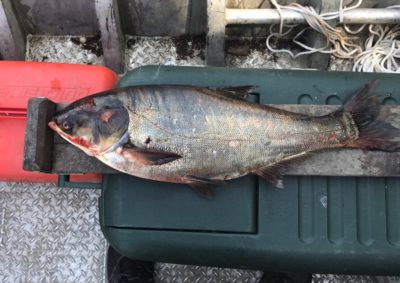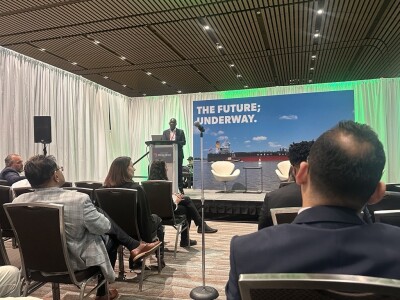An adult Asian silver carp was found in late June in a Chicago waterway below the O’Brien Lock and Dam about nine miles from Lake Michigan, raising new concerns about invasive Asian carp moving closer to the Great Lakes.
The fish was caught alive by a commercial fisherman working with the Asian Carp Regional Coordinating Committee (ACRCC), which announced the find. The discovery set off two additional weeks of sampling in the area. The 8-lb., 28" male silver carp was sent to Southern Illinois University for additional analysis including age and place of origin.
The carp issue has pitted states, politicians and businesses against one another. Carp in the Great Lakes would threaten the $7 billion fishing and tourism industries. But separating the lakes from the Mississippi River basin – one possible solution -- would cost the barge, passenger vessel, chemical, agricultural and other groups billions as well.
This is the second time in eight years of monitoring the Chicago Area Waterway System (CAWS) that a carp has been found above electric barriers installed to stop the fish. A bighead carp turned up in Lake Calumet in 2010, the committee said. The latest “finding does not confirm that a reproducing population of Asian carp currently exists above” the barriers or in the lakes, ACRCC said.
It’s the first time a silver carp has been caught above the barrier, said Kelly Baerwaldt, fisheries biologist with the U.S. Fish & Wildlife Service. While the catch is notable, “it’s also a relief that we can find a needle in a haystack. If there’s one or two, we can find them.”
U.S. Sen. Debbie Stabenow, D-Mich., called the recent find “deeply alarming.” Just days before the silver carp capture was announced, Stabenow and Sen. Gary Peters, D.-Mich., introduced legislation requiring the Trump administration to release the Brandon Road Lock & Dam study, which originally was expected out earlier this year. The Corps of Engineers considers the lock on the Des Plaines River near Joliet, Ill., a control point for keeping the menacing fish from the lakes.
The agency is evaluating a range of options from doing nothing to closing the lock while minimizing the adverse impact on users. Industry representatives have questioned the corps’ authority to move ahead and warned about the impact on navigation.
A corps spokesman would say only that the study was on hold “pending further coordination.”





